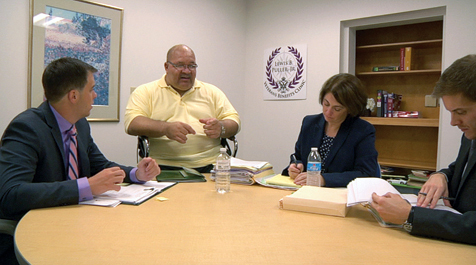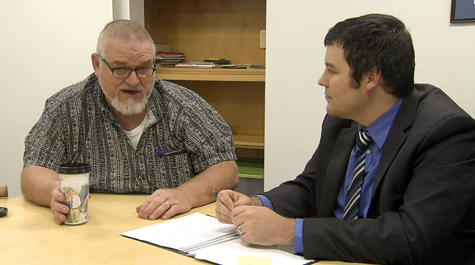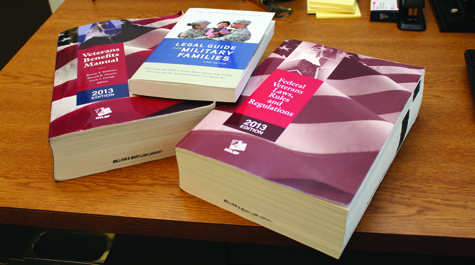Students Get Vital Skills Training While Serving Veterans
With hundreds of disability claims under their belts, the faculty and staff of the Lewis B. Puller, Jr. Veterans Benefits Clinic at the Law School know they are having a pronounced effect on veterans in need of assistance.
And then there’s the effect on law students’ lives — through expert skills training.
“The professional growth and commitment to service we see in our students is inspiring,” says Patricia E. Roberts J.D. ’92, director of the Puller Clinic and clinical professor of law. “The skills they learn have a huge impact on their future success as citizen lawyers.”
Roberts, who as director of clinical programs oversees all nine of the Law School’s clinics, feels that the Puller Clinic is uniquely situated to provide veterans with disability claims services while providing students with hands-on experience working with real clients.
The clinic is, for example, the first legal clinic in the country to address veterans’ needs holistically, combining legal and psychological assistance in representation of veterans in benefits claims. In a region with a large population of veterans, students handle the most complex and time-consuming claims, some of which are referred by Veterans Service Organizations, Department of Veterans Affairs (VA) hospitals, and congressional offices.
Alumnus Jeff Bozman J.D. ’12, for instance, learned how to manage a case through every stage of the process when he was a student.
“I learned how to structure a research plan to gather information about a client’s medical and service history, how to build legal arguments to persuade both initial decision makers and appellate reviewers, and how to negotiate with government representatives,” says Bozman, an associate at Covington & Burling LLP and a former U.S. Marine Corps officer. “Most importantly, I learned how to develop client relationships built on trust and shared commitment."
According to Roberts, students also learn how to manage clients and their expectations, deal with bureaucracy, work with complex administrative regulations, and navigate ethical issues.
“Because they’re pursuing disability compensation claims, our students can also practice administrative law at the regional office level, and at the Board of Veterans Appeals,” she says. “So they interview veterans, request information from the VA and from private healthcare providers, and often work with medical professionals outside the VA to procure an evaluation or a diagnosis to help understand a veteran’s injury or disability. With the recent addition of Professor Aniela Szymanski as staff attorney, we anticipate broadening our scope to include cases at the Court of Appeals for Veterans Claims, offering additional skill-building opportunities in written and oral advocacy for our students.”
Third-year law student William Burke finds the unpredictability of clinical work stimulating. He notes that whereas law classes tend to rely on pre-packaged hypothetical fact patterns that allow students to spot a closed set of issues, facts in a clinical setting are less clear, and the potential set of issues is limitless.
“Working in this more realistic environment has allowed me to develop my ability to separate the relevant from the irrelevant, narrow my focus to the most important issues, and gather facts effectively and efficiently,” Burke says. “Closely related to the last is client interaction. Working with the clients is teaching me to be much more patient and thorough.”
Students also gain skills by working directly with experienced members of the law profession.
“The clinic provides us the opportunity to communicate with other attorneys,” says Rachel Strubel J.D. ’16. “This is done in a setting where students have tremendous support from the supervising attorneys who provide us critical assistance and feedback.”
Students typically average 8-10 hours per week during either their 2L or 3L year; and with 19 students currently enrolled in the clinic, the hours — and effectiveness of their outreach — add up quickly.
Roberts says that many students volunteer for similar work after they graduate, and some have gone on to jobs with the Board of Veterans Appeals or the Court of Appeals for Veterans Claims. Strubel, who has already served as team leader at a Joint Agency Anti-Terrorism Task Force and as a senior instructor at the National Search and Rescue School, will serve as a Coast Guard JAG officer upon graduation.
Others, like Bozman, work at traditional law firms, but put their knowledge of military and veterans law to good use each day.
“I have applied administrative law research skills to support many other clients — both pro bono and paying — who rely on our firm to master the intricacies of complex statutes and regulations,” Bozman says.
As they develop invaluable skill sets, students also get job satisfaction through their clients.
“Already in the short time I’ve been a part of the Puller Clinic, three veterans have explained how much it means to them to have someone on their side,” Burke says. “This is especially meaningful to me because I am a veteran: helping other vets helps me get back a pride of service I haven’t felt since I left the Navy.”
---
Watch “Battling for Veterans’ Benefits,” a new video about the clinic produced by WHRO Public Media, at law.wm.edu/veterans.
Read the Puller Veterans Benefits Clinic's new blog at www.vetlawandbenefits.org.
About William & Mary Law School
Thomas Jefferson founded William & Mary Law School in 1779 to train leaders for the new nation. Now in its third century, America's oldest law school continues its historic mission of educating citizen lawyers who are prepared both to lead and to serve.


